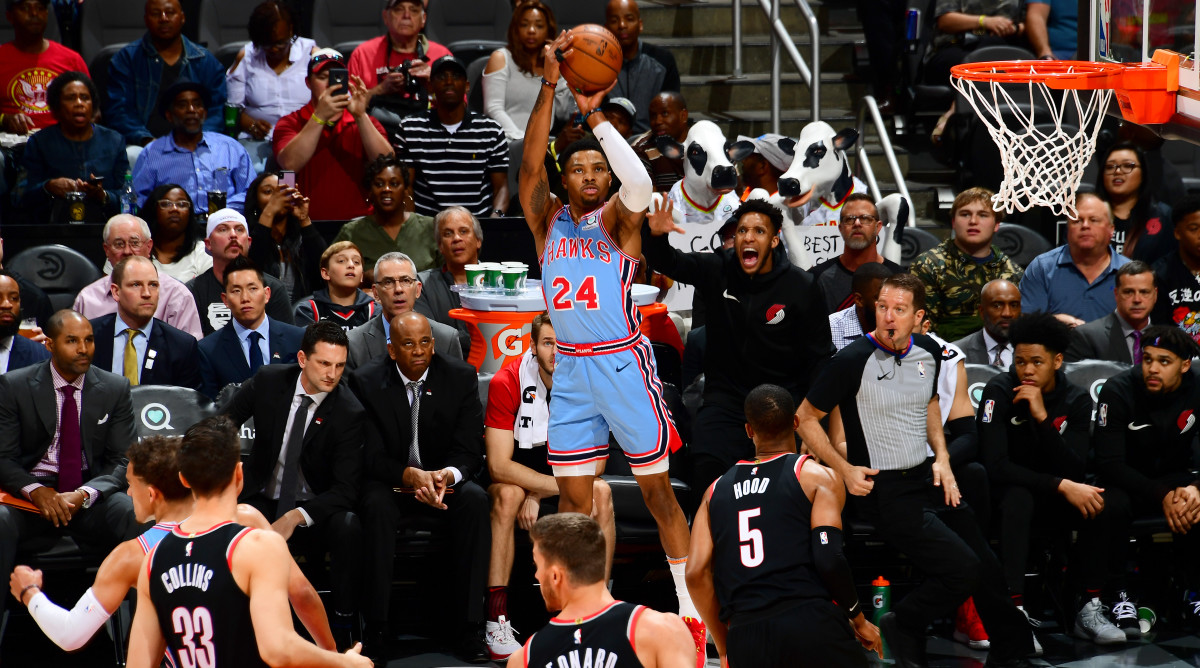Trade Grades: Trail Blazers Offload Evan Turner to Improve on the Margins

Most of the moves that transpire in the lead-up to free agency are made with cap room in mind, with one team positioning itself for larger contract offers than would otherwise be possible. Portland and Atlanta reportedly agreed to another sort: a deal of negligible financial impact in which both teams swapped the wing players they overpaid in the summer of 2016, now in the final year of their deals. According to ESPN’s Adrian Wojnarowski, the Trail Blazers will trade Evan Turner to the Hawks, straight up, for Kent Bazemore.
Let’s grade the deal.
Portland: B
Since committing rich contracts to Turner, Allen Crabbe (also a newly ordained Hawk, oddly enough), and Meyers Leonard, the Blazers have scoured the league for ways to improve the margins of their roster. Portland’s supporting cast was both distinctly lacking and increasingly expensive, which helps explain why the rumor mill returns to Damian Lillard and CJ McCollum as often as it does. There are only so many ways for the Blazers to improve their roster without reshaping it entirely.
This is one avenue. The kindest review of Turner’s time in Portland is to say that he had his moments. A more realistic one might point out how few those moments were, and how far, far between. The idea of trading Turner alone for a clear upgrade seemed impossible; his struggles were too clear, and thanks to his four-year, $70 million contract, all the more visible. Portland pulled it off, if largely by being in the right place at the right time. Of all the possible reasons this trade could have materialized, changes in Atlanta’s situation seem the most relevant. If the Blazers could have moved Turner at no real cost, they likely would have years ago. What prompted this deal was a match: a nearly identical salary, and a Hawks team looking to find Bazemore a new basketball home.
The Blazers are a better team for it. Turner and Bazemore come to the game quite differently—the former as a point forward and the latter as more of a classic supporting wing. It’s not a one-for-one replacement in terms of on-court responsibility, but Portland gets the better shooter, cutter, defender, and athlete in the exchange. Any trade-offs are negotiable as Portland builds out its roster for next season. Swapping Turner for Bazemore was always plausible. What’s unexpected is that it didn’t cost Portland so much as a second-round pick to get a deal done.

Atlanta: N/A
How should one grade a move that has so little to do with basketball? From a distance, the Hawks traded a decent two-way wing for an objectively lesser player. What savings came as a result of the deal are negligible—less than a million in salary over the course of the season. Atlanta gave up on the chance to trade Bazemore for a better player or some sort of draft consideration. It’s never easy to weigh opportunity cost against the reality of a completed trade, but the chance to move Bazemore in a friendlier deal down the line has to be accounted for.
Of course, all of this would ignore the implied motivations for the Hawks to make a deal like this in the first place. The first is to do right by Bazemore, who has been good for the locker room since joining the Hawks and a good veteran since they began their rebuild. Moving him now allows Bazemore the chance to settle in for a full season with a contending team. It also serves the secondary purpose of freeing up minutes for a Hawks team that added two new wings in the draft and another (Crabbe) via trade. Crabbe may not be much of a priority, but the Hawks moved up on draft night to select De’Andre Hunter and fought to keep the pick that became Cam Reddish. Both are important to Atlanta’s future in ways that Bazemore, frankly, is not.
Due to their differences, Turner does offer some different applications from Bazemore. Lloyd Pierce (who overlapped briefly with Turner in Philadelphia) can use Turner as his backup point guard, alleviating pressure on rising sophomore Jaylen Adams and a provisional alternative in DeAndre’ Bembry. Atlanta needs players who can handle the ball with poise, and Turner provides that. He just might not give the Hawks much of anything else.
This wasn’t a trade that made the Hawks a better team, in a transactional sense. It does, however, speak to be the kind of franchise they aim to be.
